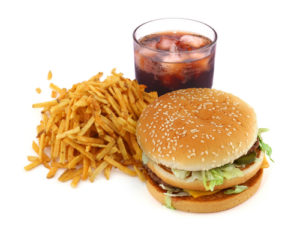
Bad news keeps coming about the highly processed foods we love to eat. So convenient, so addictive (e.g., potato chips, soda!), but so bad for our health. A recent study found more harms from eating highly processed foods (also called ultra-processed foods). They are associated with a higher risk of ovarian cancer and other cancers, and also death from cancer.
Even worse, the more one eats ultra-processed foods daily, the higher the risk of developing and dying from a variety of cancers. The ovarian and brain cancer association was especially strong.
The large study of 197,246 people, conducted in the UK, looked at the association between eating highly processed foods and the risk of developing 34 different types of cancers over a 10 year period. They found that highly processed foods were generally between 9.1% to 41.4% of the foods eaten daily. Highly processed foods averaged 48.6% of the daily calories, and ranged from 28.4% to 68.7% of daily calories.

As the researchers point out, the highly processed foods are replacing what should be eaten (fruits, vegetables, whole grains, seeds, nuts, legumes). Thus, diets rich in highly processed foods are generally nutritionally inferior, and are higher in energy, fats, salt, sugars, and lower in fiber and some micronutrients.
Chemicals in highly processed foods and packaging (e.g., acrylamide, endocrine disruptors) are ingested and cause harm to humans. Additionally, additives found in highly processed foods (e.g., emulsifiers) have negative effects on the gut microbiome and gut (intestinal) lining.
Bottom line: Eat fewer highly processed foods. Eat more foods that are unprocessed or minimally processed (fruits, vegetables, legumes, seeds, nuts, whole grains). Read the list of ingredients on labels.
Excerpts from Medical Xpress: Ultra-processed foods may be linked to increased risk of cancer
Higher consumption of ultra-processed foods may be linked to an increased risk of developing and dying from cancer, an Imperial College London-led observational study suggests.
Researchers from Imperial's School of Public Health have produced the most comprehensive assessment to date of the association between ultra-processed foods and the risk of developing cancers. Ultra-processed foods are food items which have been heavily processed during their production, such as fizzy drinks, mass-produced packaged breads, many ready meals and most breakfast cereals.
Ultra-processed foods are often relatively cheap, convenient, and heavily marketed, often as healthy options. But these foods are also generally higher in salt, fat, sugar, and contain artificial additives. It is now well documented that they are linked with a range of poor health outcomes including obesity, type 2 diabetes and cardiovascular disease.
The first UK study of its kind used UK Biobank records to collect information on the diets of 200,000 middle-aged adult participants. Researchers monitored participants' health over a 10-year period, looking at the risk of developing any cancer overall as well as the specific risk of developing 34 types of cancer. They also looked at the risk of people dying from cancer.
The study found that higher consumption of ultra-processed foods was associated with a greater risk of developing cancer overall, and specifically with ovarian and brain cancers. It was also associated with an increased risk of dying from cancer, most notably with ovarian and breast cancers.
For every 10 percent increase in ultra-processed food in a person's diet, there was an increased incidence of 2 percent for cancer overall, and a 19 percent increase for ovarian cancer specifically. Each 10 percent increase in ultra-processed food consumption was also associated with increased mortality for cancer overall by 6 percent, alongside a 16 percent increase for breast cancer and a 30 percent increase for ovarian cancer.
